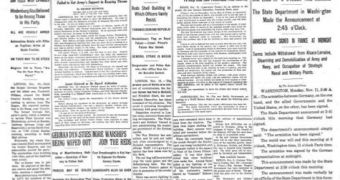The inevitable downfall of newspapers in the US should come as a surprise to no one, especially given the fact that most major publications are already struggling to cope with the effects of the global financial crisis, while smaller ones have already filed for bankruptcy. Low advertising revenues registered over the last few years, coupled with the rise of the Internet as the second most visited source of information following television, have made newspapers turn into every direction they can for help.
And while most see this problem as a matter of time, there are those who ask the question that should be on every person's mind – what will become of decent, unbiased coverage of the news? Blog author Seth Godin has a very interesting perspective on the issue, saying that democracy will be the one to suffer following the downfall of newspapers, as electronic media can be easily influenced.
“What's left is local news, investigative journalism and intelligent coverage of national news. Perhaps 2% of the cost of a typical paper. I worry about the quality of a democracy when the state government or the local government can do what it wants without intelligent coverage. I worry about the abuse of power when the only thing a corrupt official needs to worry about is the TV news. I worry about the quality of legislation when there isn't a passionate, unbiased reporter there to explain it to us,” Godin says in a recent blog entry.
“If we really care about the investigation and the analysis, we'll pay for it one way or another. Maybe it's a public good, a non profit function. Maybe a philanthropist puts up money for prizes. Maybe the Woodward and Bernstein of 2017 make so much money from breaking a story that it leads to a whole new generation of journalists,” he adds.
His concerns are shared by thousands of people, both in the US and worldwide, who say that printed media is among the few communication mediums that allow for fair and unbiased criticism to political decisions. With creeping corporate influence over the news, viewers will have no guarantees that TV stations present just the facts and not the agenda of the corporations owning them.

 14 DAY TRIAL //
14 DAY TRIAL //